听力长对话解题技巧
英语四级长对话听力的3种猜答案技巧
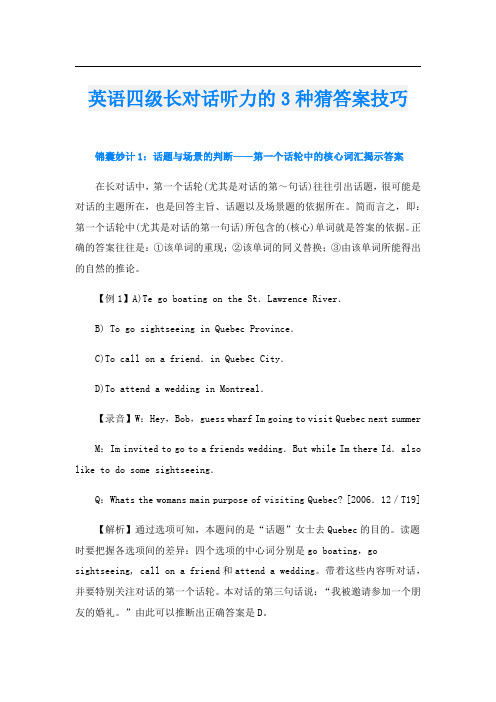
英语四级长对话听力的3种猜答案技巧锦囊妙计1:话题与场景的判断——第一个话轮中的核心词汇揭示答案在长对话中,第一个话轮(尤其是对话的第~句话)往往引出话题,很可能是对话的主题所在,也是回答主旨、话题以及场景题的依据所在。
简而言之,即:第一个话轮中(尤其是对话的第一句话)所包含的(核心)单词就是答案的依据。
正确的答案往往是:①该单词的重现;②该单词的同义替换;③由该单词所能得出的自然的推论。
【例1】A)Te go boating on the St.Lawrence River.B) To go sightseeing in Quebec Province.C)To call on a friend.in Quebec City.D)To attend a wedding in Montreal.【录音】W:Hey,Bob,guess wharf Im going to visit Quebec next summer M:Im invited to go to a friends wedding.But while Im there Id.also like to do some sightseeing.Q:Whats the womans main purpose of visiting Quebec? [2006.12/T19] 【解析】通过选项可知,本题问的是“话题”女士去Quebec的目的。
读题时要把握各选项间的差异:四个选项的中心词分别是go boating,go sightseeing, call on a friend和attend a wedding。
带着这些内容听对话,并要特别关注对话的第一个话轮。
本对话的第三句话说:“我被邀请参加一个朋友的婚礼。
”由此可以推断出正确答案是D。
【例2】A)Secretary of Birmingham Medical School.B) Head of the Overseas Students Office.C) Assistant Director of the Admissions Office.D) An employee in the city council at Birmingham.【录音】M: Sarah, you work in the admissions office, dont you?W: Yes, I, mmm, Ive been here ten years as an assistant director.Q: What is the womans present position? [2007.6/T23]【解析】名词选项题,可以判断,本题问某个人的身份。
英语四级听力长对话与短文解析与答题技巧

英语四级听力长对话与短文解析与答题技巧英语四级听力考试中,长对话和短文是必考的题型之一。
掌握解析长对话和短文的技巧对于提高听力成绩至关重要。
本文将详细介绍长对话和短文的解析方法,并提供一些答题技巧,以帮助大家更好地应对这两种题型。
一、长对话解析长对话主要考察对话中的细节理解以及推理能力。
在解析长对话时,可以按照以下步骤进行:1. 抓住对话主题:在听长对话之前,先快速阅读题目,抓住对话的主题,帮助你更好地理解对话内容。
2. 注意人物关系:对话中的人物关系对于理解对话内容非常重要,可以根据人物关系推测对话内容。
3. 留意关键词:在对话中留意出现频率较高的关键词,这些词汇往往会在答案中出现。
4. 注意修辞手法:有时对话中会使用修辞手法,如比喻、反问等,要注意理解修辞手法的含义,帮助你理解对话。
5. 推理能力:根据对话中的信息进行推理,找出暗示的答案。
二、短文解析短文主要考察细节理解和判断能力。
在解析短文时,可以按照以下步骤进行:1. 抓住短文主题:在听短文之前,先快速阅读题目,抓住短文的主题,帮助你更好地理解短文内容。
2. 注意关键词:在短文中留意出现频率较高的关键词,这些词汇往往会在答案中出现。
3. 排除干扰项:有些选项可能是干扰项,与短文内容没有直接关系,要学会排除这些选项。
4. 注意转折词:短文中常常会出现一些转折词,如but、however等,要注意这些转折词的出现,帮助你理解短文的逻辑。
5. 推理能力:根据短文中的信息进行推理,找出暗示的答案。
三、答题技巧除了掌握解析长对话和短文的方法外,还可以利用以下答题技巧来提高答题准确率:1. 预测答案:在听完问题之后,可以提前预测答案,然后在选项中找到与预测答案意思相近的选项。
2. 多听几遍:短时间内多听几遍长对话或短文,可以帮助你更好地理解内容,提高答题准确率。
3. 多做练习:通过做大量的长对话和短文练习,熟悉题型和常见的表达方式,提高答题技巧和速度。
高考听力长对话技巧
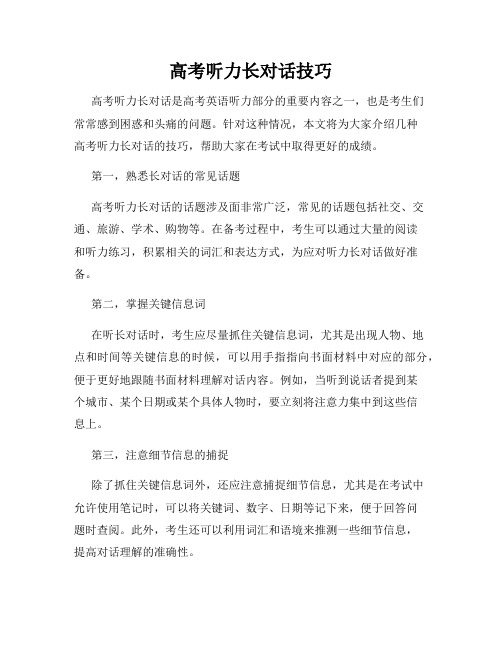
高考听力长对话技巧高考听力长对话是高考英语听力部分的重要内容之一,也是考生们常常感到困惑和头痛的问题。
针对这种情况,本文将为大家介绍几种高考听力长对话的技巧,帮助大家在考试中取得更好的成绩。
第一,熟悉长对话的常见话题高考听力长对话的话题涉及面非常广泛,常见的话题包括社交、交通、旅游、学术、购物等。
在备考过程中,考生可以通过大量的阅读和听力练习,积累相关的词汇和表达方式,为应对听力长对话做好准备。
第二,掌握关键信息词在听长对话时,考生应尽量抓住关键信息词,尤其是出现人物、地点和时间等关键信息的时候,可以用手指指向书面材料中对应的部分,便于更好地跟随书面材料理解对话内容。
例如,当听到说话者提到某个城市、某个日期或某个具体人物时,要立刻将注意力集中到这些信息上。
第三,注意细节信息的捕捉除了抓住关键信息词外,还应注意捕捉细节信息,尤其是在考试中允许使用笔记时,可以将关键词、数字、日期等记下来,便于回答问题时查阅。
此外,考生还可以利用词汇和语境来推测一些细节信息,提高对话理解的准确性。
第四,善用对比和转折在长对话中,对话人常常会使用对比和转折的句式来表达观点和态度。
考生可以通过注意听话人的语气、语调和情感变化,来理解对话人的观点。
同时,还应注意对话人的表态词,如"but"、"however"等,这些词往往暗示了对话人的转折和变化。
第五,注意上下文的逻辑关系在高考听力长对话中,对话人之间的对话往往存在一定的逻辑关系,例如因果关系、条件关系等。
考生可以通过注意对话人之间的互动和回应来理解他们之间的关系,进而推断出对话的发展方向和意义。
第六,练习多样化的听力材料为了提高对高考听力长对话的理解能力,考生可以多样化地练习听力材料,包括各类题型、不同话题和速度的长对话,以及相关的听力材料,如电视剧、电影、音频书籍等,培养自己对不同语境和语调的适应性。
总之,高考听力长对话作为高考英语听力考试中的重点内容之一,对考生的综合能力要求较高。
四级听力长对话技巧【可编辑全文】

以下总结家庭日常生活类话题经常出现的句子/ 句 型:
What form of transport do you prefer to use? What are your opinions about traffic problems? There is a problem with ... I am sorry about this inconvenience. How can we afford to buy ...? We can pay a little on ... I’ve been told you might have a vacant room. Do you want to share with any roommates or live
以下总结休闲时光类话题经常出现的句子/ 句型: I am packed and ready to leave. I can’t remember which bag it’s in. I have planned to ... I can give you a 10% discount. I’ll have to charge you 100 pounds for the night. I am going to visit ... I have also traveled a bit. It is less crowded and hotels cost less. I love train travel. Would you recommend some scenic spots for us to see
以2006年12月Conversation Two为例: 8’00
(二) 听时抓“点”
有了充分的听前预测,听时的主要任务就是抓住考 点,且掌握如下两个原则:
四级听力长对话解析与答题技巧
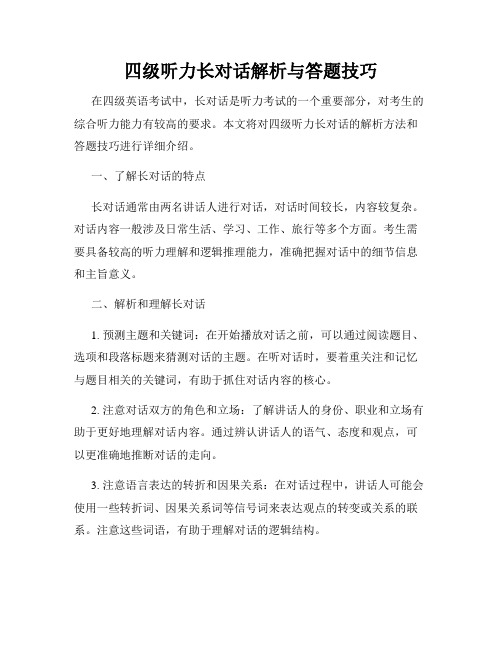
四级听力长对话解析与答题技巧在四级英语考试中,长对话是听力考试的一个重要部分,对考生的综合听力能力有较高的要求。
本文将对四级听力长对话的解析方法和答题技巧进行详细介绍。
一、了解长对话的特点长对话通常由两名讲话人进行对话,对话时间较长,内容较复杂。
对话内容一般涉及日常生活、学习、工作、旅行等多个方面。
考生需要具备较高的听力理解和逻辑推理能力,准确把握对话中的细节信息和主旨意义。
二、解析和理解长对话1. 预测主题和关键词:在开始播放对话之前,可以通过阅读题目、选项和段落标题来猜测对话的主题。
在听对话时,要着重关注和记忆与题目相关的关键词,有助于抓住对话内容的核心。
2. 注意对话双方的角色和立场:了解讲话人的身份、职业和立场有助于更好地理解对话内容。
通过辨认讲话人的语气、态度和观点,可以更准确地推断对话的走向。
3. 注意语言表达的转折和因果关系:在对话过程中,讲话人可能会使用一些转折词、因果关系词等信号词来表达观点的转变或关系的联系。
注意这些词语,有助于理解对话的逻辑结构。
4. 从上下文推测词义:遇到生词或不熟悉的表达时,可以通过上下文的逻辑关系推测其意义。
理解对话中的词汇对正确回答问题非常重要。
三、答题技巧1. 仔细阅读问题:在听对话之前,先仔细阅读题目和选项。
了解问题的要求和所需信息,有针对性地听取相关内容。
同时,要注意选项中的同义词替换和干扰信息,避免选错。
2. 避免过度依赖选项:听力考试中的选项可能是重组、改写或简化过的对话内容,不一定完全符合原词原句。
因此,切勿过度依赖选项,要以原文为准。
3. 多练习提高听力速度:通过多做模拟题和考前训练,提高听力速度和准确度。
训练中可以使用各种练习材料,例如听力练习软件、真题试卷等。
4. 注意时间管理:长对话的时间较长,考生要学会合理分配时间。
在听对话过程中,根据题目难易程度和关注度,合理决定是否跳过某题或先答后面的题目。
四、总结在四级听力长对话部分,考生需层层把握关键信息,理解讲话人的立场和观点,善于捕捉语言表达的逻辑关系和关键词。
听力长对话与短文解析与答题技巧
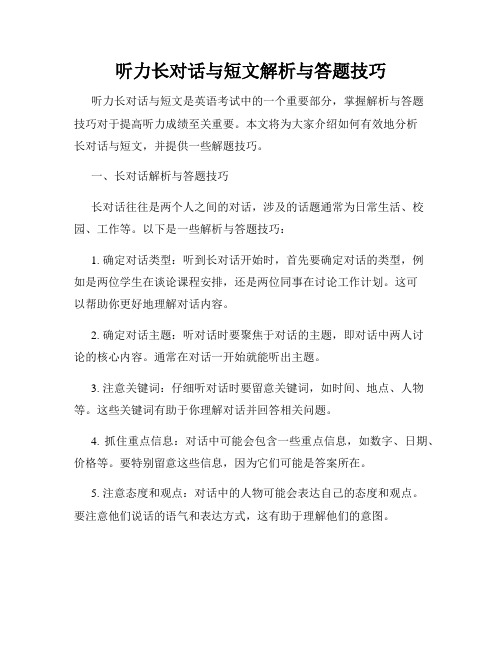
听力长对话与短文解析与答题技巧听力长对话与短文是英语考试中的一个重要部分,掌握解析与答题技巧对于提高听力成绩至关重要。
本文将为大家介绍如何有效地分析长对话与短文,并提供一些解题技巧。
一、长对话解析与答题技巧长对话往往是两个人之间的对话,涉及的话题通常为日常生活、校园、工作等。
以下是一些解析与答题技巧:1. 确定对话类型:听到长对话开始时,首先要确定对话的类型,例如是两位学生在谈论课程安排,还是两位同事在讨论工作计划。
这可以帮助你更好地理解对话内容。
2. 确定对话主题:听对话时要聚焦于对话的主题,即对话中两人讨论的核心内容。
通常在对话一开始就能听出主题。
3. 注意关键词:仔细听对话时要留意关键词,如时间、地点、人物等。
这些关键词有助于你理解对话并回答相关问题。
4. 抓住重点信息:对话中可能会包含一些重点信息,如数字、日期、价格等。
要特别留意这些信息,因为它们可能是答案所在。
5. 注意态度和观点:对话中的人物可能会表达自己的态度和观点。
要注意他们说话的语气和表达方式,这有助于理解他们的意图。
6. 多练习听力材料:多做听力练习是提高听力能力的有效途径。
可以选择一些真实的听力材料进行练习,以熟悉不同类型的对话和提高听力反应速度。
二、短文解析与答题技巧短文一般为一段话或者几段话的篇幅,涉及的话题范围更广,通常包括新闻、广告、公告等。
以下是一些解析与答题技巧:1. 浏览全文:在听短文之前,先快速浏览全文,了解短文的大致内容和主题,这可以帮助你更好地理解短文细节。
2. 注意开头和结尾:短文的开头和结尾通常会提到主题或者重要信息,要特别留意这些部分。
3. 注意时间和顺序:短文中可能会提及时间顺序或者事件的发生顺序,要注意抓住这些信息,以便更好地理解短文。
4. 注意关键词:和长对话一样,关键词在短文中同样重要。
要留意领域特定的词汇,如数字、名称、地点等。
5. 分清事实和观点:短文中的信息可能包括事实和观点两种。
要学会区分二者,以便准确回答相关问题。
英语长对话听力技巧
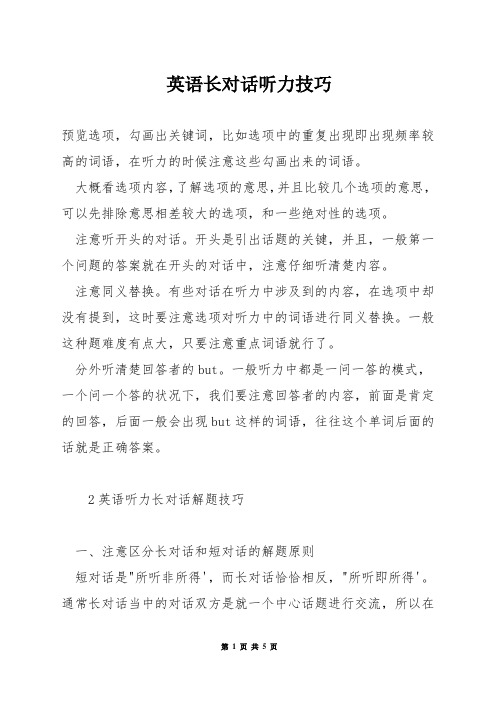
英语长对话听力技巧预览选项,勾画出关键词,比如选项中的重复出现即出现频率较高的词语,在听力的时候注意这些勾画出来的词语。
大概看选项内容,了解选项的意思,并且比较几个选项的意思,可以先排除意思相差较大的选项,和一些绝对性的选项。
注意听开头的对话。
开头是引出话题的关键,并且,一般第一个问题的答案就在开头的对话中,注意仔细听清楚内容。
注意同义替换。
有些对话在听力中涉及到的内容,在选项中却没有提到,这时要注意选项对听力中的词语进行同义替换。
一般这种题难度有点大,只要注意重点词语就行了。
分外听清楚回答者的but。
一般听力中都是一问一答的模式,一个问一个答的状况下,我们要注意回答者的内容,前面是肯定的回答,后面一般会出现but这样的词语,往往这个单词后面的话就是正确答案。
2英语听力长对话解题技巧一、注意区分长对话和短对话的解题原则短对话是"所听非所得',而长对话恰恰相反,"所听即所得'。
通常长对话当中的对话双方是就一个中心话题进行交流,所以在做长对话题目时,一定要把握对话的中心思想。
二、在听对话和问题之前,一定要预览选项做推断和猜测依据选项中的信息,推断中心话题,至少要能推断出该段对话属于哪类生活场景(如学习、工作、住宿、休闲等),然后依据几个题目的选项猜测对话的基本内容,同时注意选项长短,划出其中的关键词有助于定位的名字、地点、时间、动词等实词。
如果选项较短,很可能四个选项内容会听到多个,具体选哪个要结合问题才知道,听的时候要注意做相应的记录。
如果选项较长,很可能就是听到什么选什么,正确选项可能与原文表述完全相同也可能是原文对应句的同义转述。
三、在听录音时,要注意集中注意力每段对话的时间长度约为2分钟,很少有考生能够在这两分钟当中每个词、每句话都集中注意力去听,所以必须要大家掌握一些听的技巧,侧重听开头和结尾、转折、话题转换、语气变化之后的话语,因为这些位置往往会出考点,同时要结合之前对选项的预览和划定的关键词进行定位,把握做题节奏,边听边记。
2023英语四级六级听力长对话技巧

2023英语四级六级听力长对话技巧英语四级六级听力长对话技巧1四级听力中长对话采用两人对话的形式,就日常生活展开对话。
对话有两段,每段为5~8轮对话和3~4个问题,每段约为200~300单词。
涉及的内容深入,有一个“中心议题”,对话双方都是围绕中心而展开话题。
每段对话朗读一遍,每个问题后留有15秒的答题时间。
按题材分类,长对话主要有社会生活类、人物故事及历史类、科普知识类和文化教育类。
按照题型分类,长对话主要有细节题和推理判断题。
长对话大部分都是细节题,命题点常常是对话中所谈论的某个时间、地点、原因、事件等。
当然,题目的正确选项与对话内容中的某些字词完全相同的还是属于少数,细节题主要以答案是对话细节的同义转述为主。
正确选项不再是对话中某个细节的再现,而是换了一种形式来表达,它们是对话中某个细节的同义转述。
因此考生即使听到了对话中的某个细节,还得注意它的“其他表达方式,比如近义转换、句型转换等。
推理题在长对话中所占比例较小,每一套题中可能涉及两、三题。
推理题是相对较难的一种题型,需要考生对某个细节有深层次的理解。
由于推理不是凭空进行,而是建立在细节的基础上的合乎逻辑的推断,因此考生有必要捕捉对话的细节,找到与需要推理的相关部分,及时做笔记,还要综合问题加以分析,这样才能选出正确的答案来。
英语四级六级听力长对话技巧扩展阅读英语四级六级听力长对话技巧(扩展1)——英语四级听力长对话的技巧英语四级听力长对话的技巧1听前预测对于听力长对话非常重要。
放音间隔的时间应尽可能留作预测之用。
若想有效使用这短短几十秒的放音间隔时间,需把握以下两个原则:1. 分清主次与生活中的情形相似,双方对话的时候常有主次之分,如:一方询问,另一方作答时,关键信息多出现在作答一方,考点自然也就多出于此。
分清对话双方的主次对于我们预测考点出现的位置很重要,方法也简单易行。
例:22. A) It was about a little animal.B) It took her six years to write.C) It was adapted from a fairy tale.D) It was about a little girl and her pet.23. A) She knows how to write best-selling novels.B) She can earn a lot of money by writing for adults.C) She is able to win enough support from publishers.D) She can make a living by doing what she likes.24. A) The characters. B) The readers.C) Her ideas. D) Her life experiences.25. A) She doesn"t really know where they originated.B) She mainly drew on stories of ancient saints.C) They popped out of her child-hood dreams.D) They grew out of her long hours of thinking.通看下划线部分不难发现,几乎所有的选项都与女性会话者有关,可料想此对话中男性会话者多提出问题,女性多做答复,听时当然主要听女性会话者所说的内容。
四级长对话听力技巧及练习

1
W: That’s more expensive than gold. Is it really worth that much?
They compared the parent stars to the Sun.
Q: How did scientists establish the existence of the planets?
They were able to see the planets with a telescope.
二、听重点,抓关键,悟语气。
Q: What does the man probably think about the cost of the new weight?
It is a small amount to pay for so much precious metal.
It is difficult to judge the value of such an object.
Absurd.
Fantastic.
Exciting.
Boring.
此题应选B)。woman 在说这段话时,语气较重,升调很多,暗含了她对man的评价很不满,甚至有种责备的意味。因此woman 对影片拍摄的评价态度与man相反。故选B)。
听力技巧重在捕捉信息、进行逻辑推理以及常识判断。不过技巧终归是技巧,无法等效替代平时的练习。毕竟,God helps those who help themselves(天助自助者)。最后祝大家四级考试顺利过关!
四级真题听力长对话解题技巧总结

四级真题听力长对话解题技巧总结在四级英语考试中,听力长对话是考生们经常遇到的题型之一。
长对话题材广泛,内容相对复杂,对考生的综合听力能力要求较高。
因此,我们需要一些有效的解题技巧来帮助我们更好地理解和回答长对话题。
一、抓住关键词在长对话中,关键词经常是我们理解对话内容的线索。
关键词包括人名、地名、时间、数字、具体事物等。
当我们听到关键词时,要迅速作出标记,以便更好地理解关键信息和整个对话的逻辑。
二、注意听对话的开头和结尾对话的开头和结尾往往包含了对话中最重要的信息和主题。
开头通常是对问题或话题的引入,而结尾则是对问题的总结或回答。
所以,在听对话时,特别要注意开头和结尾部分,这有助于我们更好地把握对话的内容和要点。
三、注意听对话的转折词和信号词转折词和信号词经常暗示了对话中的重要信息和发展方向。
转折词如"but"、"however"、"on the other hand"等,用来表示转折关系;信号词如"first"、"second"、"finally"等,用来表示对话的顺序或逻辑关系。
通过注意这些词语的使用,我们能更准确地找到所需答案的位置。
四、抓住说话者的态度和观点在对话中,每个人都有自己的态度和观点,这些反映了他们在讨论主题时的立场和看法。
我们要仔细抓住说话者的态度和观点,以便更好地理解对话内容和问题的答案。
五、注意关注细节长对话中会提到很多具体细节,如时间、地点、人物身份、活动等。
这些细节经常是对话题目的答案。
因此,我们要时刻保持专注,特别注意这些细节信息的重要性。
六、利用上下文推测答案如果我们错过了一些细节或关键信息,我们可以通过上下文来推测答案。
对话的整体语境和逻辑有时能够帮助我们理解问题的答案。
因此,不要因为错过了某个关键词而放弃答题,要善于通过推断和推理来找到正确的答案。
初中期末听力技巧分享听懂长对话与讲座并准确回答问题的技巧与方法
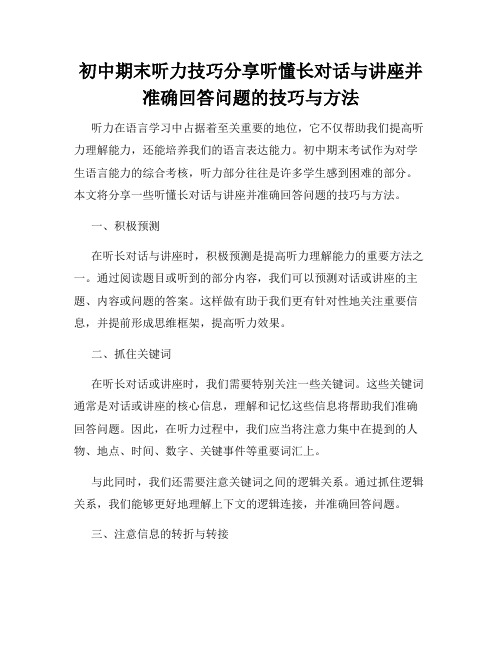
初中期末听力技巧分享听懂长对话与讲座并准确回答问题的技巧与方法听力在语言学习中占据着至关重要的地位,它不仅帮助我们提高听力理解能力,还能培养我们的语言表达能力。
初中期末考试作为对学生语言能力的综合考核,听力部分往往是许多学生感到困难的部分。
本文将分享一些听懂长对话与讲座并准确回答问题的技巧与方法。
一、积极预测在听长对话与讲座时,积极预测是提高听力理解能力的重要方法之一。
通过阅读题目或听到的部分内容,我们可以预测对话或讲座的主题、内容或问题的答案。
这样做有助于我们更有针对性地关注重要信息,并提前形成思维框架,提高听力效果。
二、抓住关键词在听长对话或讲座时,我们需要特别关注一些关键词。
这些关键词通常是对话或讲座的核心信息,理解和记忆这些信息将帮助我们准确回答问题。
因此,在听力过程中,我们应当将注意力集中在提到的人物、地点、时间、数字、关键事件等重要词汇上。
与此同时,我们还需要注意关键词之间的逻辑关系。
通过抓住逻辑关系,我们能够更好地理解上下文的逻辑连接,并准确回答问题。
三、注意信息的转折与转接在长对话与讲座中,信息的转折与转接是比较常见的现象。
例如,对话中的两个人物可能会对同一个问题持有不同的观点,或者讲座中的某一内容会因时间、地点、人物等因素发生变化。
因此,我们在听力时,要注意信息的转折与转接,及时调整自己的思维,避免对信息的理解产生偏差。
四、练习答题技巧在听懂长对话与讲座后,准确回答问题也是需要技巧的。
以下是一些常用的答题技巧:1. 精确定位:在回答问题之前,我们需要精确地定位到问题所涉及的信息段落或位置。
通过积极预测和抓住关键词的方法,我们能够快速找到问题的答案所在,提高回答问题的准确性。
2. 复述重要信息:在回答问题时,我们可以通过复述问题或重要信息的方式来巩固记忆并思考答案。
这有助于我们更好地理解问题的要求,并思考最合适的回答方式。
3. 注意选项干扰:在选择题中,选项干扰是常见的情况。
我们需要仔细阅读并对比选项,排除干扰项,并选择最符合原文意思的选项。
长对话听力技巧

长对话听力技巧听力中的长对话就像一场神秘的冒险,有时候我们能顺利通关,有时候却被搞得晕头转向。
今天啊,我就来跟大家唠唠长对话听力的那些技巧,这可都是我自己摸爬滚打总结出来的,老有用了!我有个朋友叫小李,他就特别害怕长对话听力。
有一回我们一起做听力练习,那长对话一出来,他就皱眉头,像个苦瓜似的。
他跟我说:“这长对话就像一团乱麻,我都不知道从哪儿开始听。
”我就笑他,我说:“你呀,就是没找对方法。
”那长对话听力的第一个技巧就是提前看题。
这就好比你要去一个陌生的地方,你得先看看地图吧。
长对话开始前,咱们有那么一小段时间可以看题目和选项。
这时候你就得像个侦探似的,从题目和选项里找线索。
比如说,你看到题目问的是关于旅行的事儿,选项里又提到了飞机、酒店这些词,那你心里就大概有个底了,等会儿听的时候就着重听这方面的内容。
我跟小李说:“你看这题目的时候要是漫不经心,那等听的时候就跟没头的苍蝇似的,到处乱撞,能听出个啥来呢?”再来说说听的过程中的技巧。
长对话一般都有好几轮问答,人物可能会说好多话。
这时候你得集中注意力,可不能分心。
就像你在看一场精彩的球赛,你眼睛得死死盯着球,不能一会儿看这儿,一会儿看那儿。
我记得有一次考试,长对话里有个特别关键的信息,是关于时间的。
我当时就全神贯注地听着,就怕错过。
结果我听到了,可我旁边那哥们儿就没听到,他考完就直跺脚,懊悔得不行,说:“哎呀,我怎么就没听到呢,这分丢得太冤了!”在听的时候,咱们还要学会抓关键词。
关键词就像灯塔一样,能给你指引方向。
什么是关键词呢?像一些名词啊,动词啊,还有表示转折、因果关系的词。
比如说“but”“because”“however”这些词虽然我不让多用在文章里,但在听力里可都是宝贝。
听到“but”,你就得竖起耳朵了,后面的内容往往很重要。
有一回我和朋友一起分析长对话听力,那对话里前面说了一堆看似没用的话,突然一个“but”,后面的信息就是答案所在。
我就跟朋友说:“你看,这‘but’就像个魔法词,一下子就把重点给变出来了。
四级真题分析听力长对话技巧
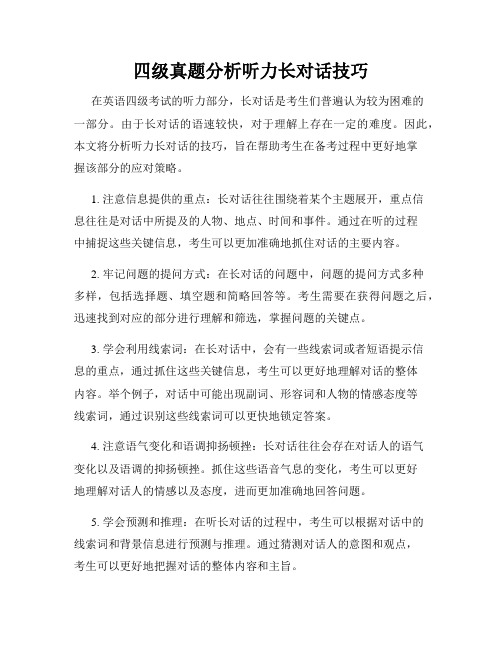
四级真题分析听力长对话技巧在英语四级考试的听力部分,长对话是考生们普遍认为较为困难的一部分。
由于长对话的语速较快,对于理解上存在一定的难度。
因此,本文将分析听力长对话的技巧,旨在帮助考生在备考过程中更好地掌握该部分的应对策略。
1. 注意信息提供的重点:长对话往往围绕着某个主题展开,重点信息往往是对话中所提及的人物、地点、时间和事件。
通过在听的过程中捕捉这些关键信息,考生可以更加准确地抓住对话的主要内容。
2. 牢记问题的提问方式:在长对话的问题中,问题的提问方式多种多样,包括选择题、填空题和简略回答等。
考生需要在获得问题之后,迅速找到对应的部分进行理解和筛选,掌握问题的关键点。
3. 学会利用线索词:在长对话中,会有一些线索词或者短语提示信息的重点,通过抓住这些关键信息,考生可以更好地理解对话的整体内容。
举个例子,对话中可能出现副词、形容词和人物的情感态度等线索词,通过识别这些线索词可以更快地锁定答案。
4. 注意语气变化和语调抑扬顿挫:长对话往往会存在对话人的语气变化以及语调的抑扬顿挫。
抓住这些语音气息的变化,考生可以更好地理解对话人的情感以及态度,进而更加准确地回答问题。
5. 学会预测和推理:在听长对话的过程中,考生可以根据对话中的线索词和背景信息进行预测与推理。
通过猜测对话人的意图和观点,考生可以更好地把握对话的整体内容和主旨。
6. 多做真题训练:最后,为了更好地掌握长对话部分,考生需要进行大量的真题练习。
通过反复练习,考生可以逐步熟悉长对话的表达方式和内容,提高听力水平和答题效率。
总之,通过以上的技巧,考生可以更好地应对四级真题听力长对话部分,提高听力理解能力和答题准确度。
在备考过程中,坚持练习和积累经验是十分重要的。
祝愿所有考生能够取得优异的成绩!。
听力长对话解析与答题技巧

听力长对话解析与答题技巧在英语听力考试中,长对话是考生们常常遇到的一种题型。
长对话通常由两个人进行真实或虚构的对话组成,涵盖了各种日常情景和话题。
掌握听力长对话解析与答题技巧,对于提高听力成绩至关重要。
本文将介绍一些有效的听力长对话解析与答题技巧,帮助读者在考试中更好地应对这一题型。
1. 重点关注话题长对话涵盖的话题广泛,可能涉及学校生活、旅行、工作、购物等。
在听长对话之前,应该提前预习相关话题的词汇和常见表达,掌握相关背景信息能够帮助我们更好地理解对话内容。
2. 注意对话人物的身份和关系在长对话中,通常会给出对话人物的身份和关系背景信息。
正确理解对话人物之间的关系对于解答问题非常重要。
要留意对话中的代词和指示词,如he, she, they, this等,从中推测出对话人物的身份和关系。
3. 着重抓主题句和信息句在听对话时,要紧紧抓住主题句和信息句,重点关注与问题相关的内容。
主题句通常出现在对话的开头或结尾,它能够给出对话的主要内容。
而信息句则提供了细节和支持信息,有助于回答具体问题。
注意听取被提问的问题和关键词,结合主题句和信息句,寻找与问题相关的回答内容。
4. 注意非语言信息除了语言表达外,对话中还存在着大量的非语言信息,如语气、语调、表情、姿势等。
这些非语言信息可以给我们提供更多的线索,帮助我们更好地理解对话内容。
要善于捕捉和理解这些非语言信息,结合语言信息进行综合分析。
5. 综合信息进行推断在长对话中,有时并不会直接给出问题的答案,需要通过综合对话内容进行推断。
在推断过程中,要结合对话中的重要词汇、上下文语境以及个人常识进行分析。
通过推断和判断,找出与问题相关的内容。
6. 注意时间和数字信息长对话中经常涉及到时间和数字信息,如日期、时间、费用等。
这些信息往往是问题的关键,但同时也是考点和干扰项。
要仔细听取对话中的时间和数字信息,将其与问题进行对比和校准,避免被干扰项所迷惑。
7. 利用笔记和图表辅助理解在听长对话时,可以利用笔记和图表辅助理解和整理信息。
英语四级听力长对话解题技巧
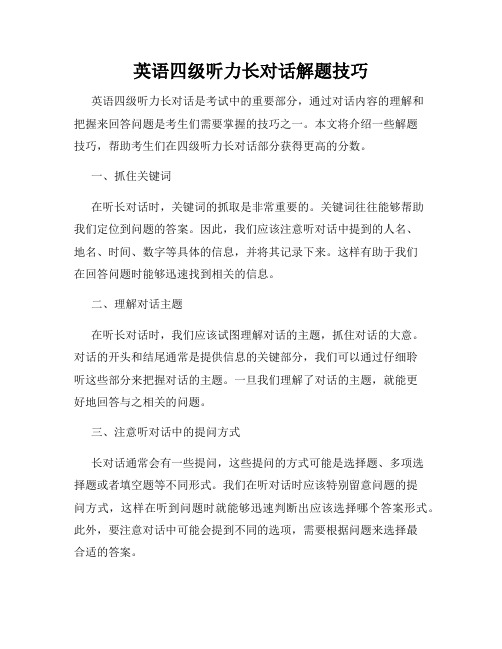
英语四级听力长对话解题技巧英语四级听力长对话是考试中的重要部分,通过对话内容的理解和把握来回答问题是考生们需要掌握的技巧之一。
本文将介绍一些解题技巧,帮助考生们在四级听力长对话部分获得更高的分数。
一、抓住关键词在听长对话时,关键词的抓取是非常重要的。
关键词往往能够帮助我们定位到问题的答案。
因此,我们应该注意听对话中提到的人名、地名、时间、数字等具体的信息,并将其记录下来。
这样有助于我们在回答问题时能够迅速找到相关的信息。
二、理解对话主题在听长对话时,我们应该试图理解对话的主题,抓住对话的大意。
对话的开头和结尾通常是提供信息的关键部分,我们可以通过仔细聆听这些部分来把握对话的主题。
一旦我们理解了对话的主题,就能更好地回答与之相关的问题。
三、注意听对话中的提问方式长对话通常会有一些提问,这些提问的方式可能是选择题、多项选择题或者填空题等不同形式。
我们在听对话时应该特别留意问题的提问方式,这样在听到问题时就能够迅速判断出应该选择哪个答案形式。
此外,要注意对话中可能会提到不同的选项,需要根据问题来选择最合适的答案。
四、利用上下文信息在听长对话时,我们可以利用对话中提供的上下文信息来理解对话内容。
有时候,对话中的某些句子可能不太容易理解,但通过上下文的线索,我们可以推断出这些句子的意思。
因此,要善于充分利用上下文信息来帮助我们理解对话的细节和推断出正确的答案。
五、多听多练英语四级听力长对话的解题技巧需要通过多听多练来掌握。
通过多次听长对话,我们能够熟悉对话的形式和题型,提高对话内容的理解和把握能力。
可以选择一些模拟题来进行练习,这样能够更好地了解自己在听长对话方面的薄弱点,并有针对性地进行提高。
六、注意时间管理在英语四级听力长对话部分,时间是有限的。
因此,我们要注意控制好答题的时间。
如果遇到某个问题无法立即得出答案,可以暂时跳过,继续往下听,争取在限定的时间内完成更多的题目。
然后再回过头来仔细思考这些未作答的问题,尽可能争取更多的得分机会。
六级听力长对话的技巧

六级听力长对话的技巧包括:
1. 提前阅读选项:在播放对话之前,抓紧时间阅读各个选项,理解每个问题的主题和选项的核心信息。
2. 抓住问题重点:注意捕捉5W和1H,即时间(When)、地点(Where)、人物(Who)、事件
(What)、原因(Why)和方式(How),有助于了解和预测对话的主要内容。
3. 筛选无关信息:对话中可能包含一些无关的信息,考生要注意筛选,集中注意力在关键信息上。
4. 定位关键信息和细节:听到与问题相关的关键信息和细节时,及时标注和定位,以便答题时能够快速
准确地回忆起相关信息。
5. 注意转折词:像but、however等转折词会引出重要的信息,往往表示观点的转折或强调,要特别注
意。
6. 推测说话者意图:通过对话的语气、语调和内容,推测出说话者的意图或态度。
7. 多做模拟题:多做历年六级听力长对话的模拟题,熟悉题型和解题技巧,提高自己的应试能力。
8. 保持冷静自信:遇到难题不要慌张,保持冷静和自信,运用上述技巧寻找答案,相信自己能够克服困
难。
遵循这些技巧,相信你在六级听力长对话部分会有更好的表现。
祝你考试顺利!。
英语听力听长对话

英语听力听长对话英语听力听长对话需要一些技巧和策略,以下是一些建议:预读选项:在听长对话之前,先预读选项,了解对话的主题和可能的问题,这有助于您更好地理解对话的内容。
集中注意力:在听长对话时,要集中注意力,不要分心或走神。
如果您的注意力分散了,您可能会错过重要的信息。
注意关键词:在听长对话时,要注意关键词,这些关键词可以帮助您理解对话的内容。
理解对话的上下文:在听长对话时,要理解对话的上下文,这有助于您更好地理解对话的内容。
练习听力技巧:在练习听力时,要练习听力技巧,例如听取主要思想、识别说话者的意图等。
多听英语:最后,要多听英语,这有助于提高您的英语听力水平。
您可以通过听英语广播、看英语电影、听英语歌曲等方式来练习听力。
总之,英语听力听长对话需要一些技巧和策略,通过不断的练习和积累经验,您可以提高自己的听力水平。
以下是一段英语长对话的例子:M: Hi, Mary. How was your day?W: It was okay. I had a busy morning and then a relaxing afternoon.M: What did you do this morning?W: I had a meeting with my boss and then I went to the market to buy some groceries.M: What did you buy?W: I bought some fruits and vegetables. Then I went to the bookstore and bought a book on cooking.M: That sounds like a good book to read. What do you want to cook?W: I'm not sure yet. I might try some new recipes.M: That sounds like fun. I hope you have a great time cooking tonight.这段对话的主题是关于购物的。
四级听力长对话技巧
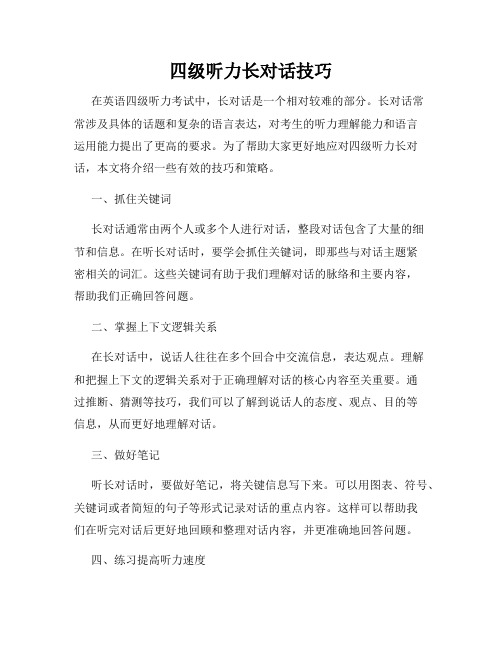
四级听力长对话技巧在英语四级听力考试中,长对话是一个相对较难的部分。
长对话常常涉及具体的话题和复杂的语言表达,对考生的听力理解能力和语言运用能力提出了更高的要求。
为了帮助大家更好地应对四级听力长对话,本文将介绍一些有效的技巧和策略。
一、抓住关键词长对话通常由两个人或多个人进行对话,整段对话包含了大量的细节和信息。
在听长对话时,要学会抓住关键词,即那些与对话主题紧密相关的词汇。
这些关键词有助于我们理解对话的脉络和主要内容,帮助我们正确回答问题。
二、掌握上下文逻辑关系在长对话中,说话人往往在多个回合中交流信息,表达观点。
理解和把握上下文的逻辑关系对于正确理解对话的核心内容至关重要。
通过推断、猜测等技巧,我们可以了解到说话人的态度、观点、目的等信息,从而更好地理解对话。
三、做好笔记听长对话时,要做好笔记,将关键信息写下来。
可以用图表、符号、关键词或者简短的句子等形式记录对话的重点内容。
这样可以帮助我们在听完对话后更好地回顾和整理对话内容,并更准确地回答问题。
四、练习提高听力速度长对话时间较长,信息量较大,考生需要具备较快的听力速度。
为了提高听力速度,可以多做听力练习,尤其是长对话的练习。
可以选择一些与四级听力类似的录音材料进行听写,提高对长对话的听写能力和听力反应速度。
五、理解说话人的意图在长对话中,说话人往往会隐含某种意图,例如表达观点、提出建议、解决问题等。
理解说话人的意图有助于我们更好地理解对话的主旨和要点。
通过分析说话人所说的话语和语气,我们可以推断他们的态度和意图,帮助我们回答相关问题。
六、积累常见话题词汇长对话的话题多种多样,以家庭、学业、社交、工作等为主要内容。
针对这些常见话题,我们应该积累相关的词汇和表达方式,以便在听长对话时更好地理解和运用。
可以通过背诵单词、模拟对话等方式进行积累和提高。
总结通过抓住关键词、掌握上下文逻辑关系、做好笔记、练习提高听力速度、理解说话人的意图以及积累常见话题词汇,我们可以在四级听力长对话中取得更好的成绩。
听力长对话考试技巧

四六级听力长对话考试技巧长对话篇幅较长,想要听过之后就能将主要内容都清楚地记在脑子里,几乎是不可能的。
而此题型同学们只有听一遍的机会,因此,我们必须学会边听边记。
长对话听的技巧,如下:一、抓住首句对话的开头往往包含着重要的主题信息,对整个对话的内容进行概括和提示,反映说话人所谈论的中心话题。
长对话中的第一题很可能是针对对话的开头提问,同学们一定要多留心。
二、留意对话中一问一答的“答者”长对话中往往出现多个一问一答,回答人的话,常常是长对话的出题重点。
根据“听到什么选什么”的原则,可以不用等到最后的问题出现,就做出回答。
三、留意重复率较高的词或短语对话的关键内容理所当然会得到说话人的强调,而非常明显的强调方式就是重复,而且重复的词语往往能够揭示对话的主题。
因此,对那些对话双方多次提到的词语或内容应进行重点记忆。
四、对常考类型有一定的了解和熟悉经过对长对话历年真题的分析和整理,四、六级长对话有几类常考的类型:1)日常休闲类;2)校园生活类;3)工作职场类;4)正式访谈类。
对这几类型题中常出现的词汇,一些共同的框架结构,同学们要有所了解。
接下来,我们为大家一一解密。
1)日常休闲类:近年来,四、六级听力有一个大的趋势:越来越生活化。
无论是短对话,还是长对话,其中有许多与娱乐休闲、日常生活真实场景非常接近的听力题目。
这里把它们总称为:日常休闲类。
日常休闲类有一些常见的词和短语,同学平时可以注意积累。
这里给大家罗列一部分,以资参考。
做这类题目,不要纠结部分没听懂的部分,其实这些听不懂的内容正好不是考点;另外,即使没听懂,也可结合生活常识,做大胆猜测。
日常休闲场景:romantic stories: 爱情片detective stories: 侦探片sculpture: 雕塑art gallery: 画廊;美术馆be enthusiastic for: 热衷于a good way to kill time: 消磨时间的好方式go sightseeing: 观光see a different type of movie for a change: 看部不同类型的电影换换口味租房、住宿场景:apartment: 公寓;套间rent: 租金;出租tenant: 房客,租户landlord: 房东roommate: 室友dormitory: 宿舍accommodation: 住宿off campus: 不住校内2)校园生活类当然,对于考生而言,与日常生活最亲近的是什么?校园生活!这一长对话类型是四、六级听力借鉴老托福(TPO)的结果。
- 1、下载文档前请自行甄别文档内容的完整性,平台不提供额外的编辑、内容补充、找答案等附加服务。
- 2、"仅部分预览"的文档,不可在线预览部分如存在完整性等问题,可反馈申请退款(可完整预览的文档不适用该条件!)。
- 3、如文档侵犯您的权益,请联系客服反馈,我们会尽快为您处理(人工客服工作时间:9:00-18:30)。
例如07年6月第22题:
22. A) Demand compensation from the hotel.
B) Ask for an additional discount.
C) Complain to the hotel manager.
命题规律
长对话融汇了短对话的特点,但是长对话并不是短对话的简单相加。对于听力长对话,考生应始终牢记:不要奢望将其内容一字不落地完全听懂并且记住。因为即使在日常生活中用母语对话,这也几乎是不可能的,同时也是不必要的。在日常生活中,我们只要掌握自己关心的信息,而在听力考试中,我们则要抓住关键信息。要准确判断哪些是关键信息,我们需要对命题规律有所了解。大学英语四级考试长对话部分的命题模式通常有以下六大类:
听力长对话
四级听力长对话共两篇,由一男一女两人的对话组成,包含6-9轮对话,每篇在240词左右,每篇后面设置3-4题,共7道题。虽然仍以对话形式出现,但长对话承载的信息量比短对话大,而且问题是在整篇对话之后提出,各篇200词以上的长度已经开始对同学们注意力的集中程度提出挑战,使得考生在听音时很难抓住关键信息。其实,可以把长对话认为是短对话和听力短文的结合,因为长对话在四级考试中就是听力短文式的出题方式用短对话的形式进行表现。因此也可以把听力长对话看作转入长篇听力的技巧与心理调试阶段,毕竟后面的篇章理解与复合式听写对听解的能力与技巧要求更高。
三、 解题技巧
I 预览选项,预测对话范围
浏览选项的主要目的是预测该题的提问、预测谈话主题、扫除生僻单词和易混淆词的障碍。有效的预览可以帮助考生在听音之前就对长对话内容有所窥探,先拔头筹。预览时发现选项都比较简短时,可以概括地预测提问的性质;如果发现选项比较长,则要寻找选项间的异同点。通常情况下,特别长的选项往往有很多共同的内容,只有一些小地方不同,而不同之处就是答题的关键所在,需要特别关注。
19. A) To go boating on the St. Lawrence River.
B) To go sightseeing in Quebec Province.
C) To call on a friend in Quebec City.
D) To attend a wedding in Montreal.
M: See what?
W: In the paper, it says there is a man going around pretending he’s from the electricity board. He’s been calling at people’s homes, saying he is coming to check that all their appliances are safe. Then he gets around them to make him a cup of tea, and while they are out of their room he steals their money, handbag, whatever and makes off with it.
B) It will involve lots of train travel.
C) It will enable her to improve her Chinese.
D) It will give her more chances to visit Japan.
录音原文:
W: No, I haven’t. But I’ve traveled on the Glacial Express to Switzerland and I traveled across China by train about 8 years ago. I love train travel. That’s why I’m very interested in this job.
B) Ads promoting electric appliances.
C) The description of a thief in disguise.
D) A new policy on pensioners’ welfare.
录音原文:
W: Gosh! Have you seen this, Richard?
Q: Who thinks Philosophy graduates have limited job opportunities?
例如2007年12月第22题:
22. A) At home.
B) In the man’s car.
C) At the airport.
D) By the side of a taxi.
W: Oh, they had my best interest at heart, of course, my parents. They always do, don’t they? They believe my job prospects would have been pretty limited with my degree in philosophy. Plus, they give me a really generous allowance, but I’m beginning to feel I am wasting my time and their money. They would be so disappointed, though if I told them I was quitting.
M: That’s nice, Shelly. But do you mean the province of Quebec, or Quebec City?
W: I mean the province. My friend’s wedding is in Montreal, so I’m going there first. I’ll stay for five days. Is Montreal the capital city of the province?
Q: What’s the woman’s main purpose of visiting Quebec?
VI以人物关系、地点场景命题为选项问细节和考查综合推断
例如2006年6月第24题:
24. A) Karen’s friend.
B) Karen’s parents.
C) Karen’s lecturers.
D) Karen herself.
录音原文:
W: Oh, they had my best interest at heart, of course, my parents. They always do, don’t they? They believe my job prospects would have been pretty limited with my degree in philosophy. Plus, they give me a really generous allowance, but I’m beginning to feel I am wasting my time and their money. They would be so disappointed, though if I told them I was quitting.
I 以对话开头为目标设题
对话的开头部分一般会涉及谈话主题、人物身份、谈话场景等信息,是设计考题的常选之处。
例如2007年6月第23题:
23. A) An employee in the city council at Birmingham.
B) Assistant Director of the Admissions Office.
W: Yes, I’m… (23) I’ve been here ten years as an Assistant Director.
Q: What is the woman’s present position?
II 以对话结尾为目标设题
例如2008年6月第25题:
25. A) It will bring her potential into full play.
Q:What does the woman want the man to read in the newspaper?
IV 以动词原形或-ING形式设选项问动作
选项均为动词原型或动词-ING形式的题目常被命题人采用,设问一般问正在发生的动作或将要发生的动作。
例如2006年6月的第25题:
25. A) Changing her major.
B) Spending less of her parents’ money.
C) Getting transferred to the English Department.
D) Leaving the university.
录音原文:
Q: Why is the woman applying for the new job?
III 以名词短语设选项问事件或主题
选项均为名词短语,设问一般问对话谈论的事件或主题。
例如2008年6月第19题:
19. A) A notice by the electricityw, you’re taking just one case. Is that right?
W: No, there’s one in the hall as well.
Q: Where does the conversation most probably take place.
